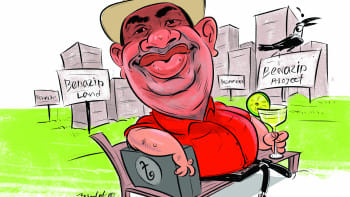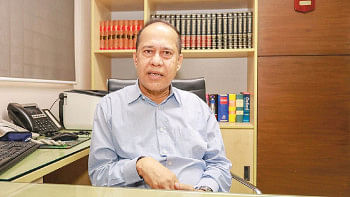Benazir's corruption and the crisis of accountability

The year was 2018. On August 30, the results of Transparency International Bangladesh's (TIB) "Corruption in Service Sectors: National Household Survey 2017" were released. According to the survey, the country's law enforcement agencies (LEAs) ranked in the highest position in terms of the experience of corruption by surveyed households. Of the households that received services from them, 72.5 percent were victims of different forms of corruption.
The Bangladesh Police Service Association (BPSA) rejected the TIB survey results in a statement issued on September 11, 2018. The statement, sent by the additional deputy commissioner of Dhaka Metropolitan Police, also the office secretary of the Police Service Association, alleged that the TIB's survey report "identified the police as a corrupt institution based on preconceived notions." It was also claimed that, "In case of any unlawful behaviour of the police, proper legal action is taken after investigation."
The story of identifying the LEAs as the "most corrupt sector" in the TIB survey and subsequent rejection by the BPSA came to my mind in the wake of the recent allegations of massive corruption against former police and Rab chief Benazir Ahmed. Documents from the Anti-Corruption Commission (ACC) show that Benazir and his family bought at least 204.5 acres of land between 2009 and 2023. Of these, 112 acres were purchased during his tenure as inspector general of police (IGP) and Rab chief.
Was Benazir Ahmed's purchase of such a vast amount of land while he was head of police and Rab consistent with the legitimate income he was earning? Is it not an illegal act to force people to sell land by intimidation? Where was the process of "legal action" claimed by the BPSA when Benazir was engaging in such unlawful behaviour day after day as a senior officer in the police force? Why was Benazir's corruption exposed only after his retirement, and not when he was in office?
Not only was no action taken against Benazir's massive corruption and abuse of power when he was in office, he was also being given one reward after another. This is not only an internal problem of the LEAs. The entire government, including the ministry of home affairs, is also responsible here.
The Public Security Division of the home ministry honoured him with the Integrity Award 2020-21. But ACC data shows that he and his family bought nearly 87.9 acres of land in 2020 and 2021. The Integrity Award is supposed to be given to someone who meets the standards of scrupulousness and honesty. Where were those standards when Benazir was given the award? Apart from the Integrity Award, Benazir was awarded the highest medal of the police force, Bangladesh Police Medal (BPM), a total of five times between 2011 and 2019. With so many intelligence agencies in the country and so much surveillance, is it at all believable that the authorities, including the LEAs, were not aware of his illegal activities? How dysfunctional could a country's institutional system be that the person who was involved in massive corruption was rewarded time and again, instead of being punished?!
The government and law enforcement agencies claim that Benazir Ahmed's corruption is his personal responsibility, that no agency or ministry will take responsibility for him. The problem with this type of claim is that when Benazir was committing the crimes, he held important positions in the agencies concerned. Moreover, he used his administrative powers and even members of the agencies under his control for his personal benefit. For example, according to a report published in The Daily Star, during his tenure as IGP and Director General of Rab, Benazir Ahmed purchased over 600 bighas of farmland by intimidating the Hindu community in the Gopalganj Sadar Upazila, and Rajoir Upazila of Madaripur. Benazir engaged a police officer named Taimur Islam to buy the land. Taimur used to go to the land owners on Benazir's behalf and pressure them to sell the land at reduced prices, threatening them that they would lose the land anyway without getting any compensation if they did not sell that to Benazir. Benazir also engaged several police and Rab officials to supervise the construction work of one of his resorts until he went into retirement in 2022. How pathetic is it that a man whose responsibility was to protect citizens has instead used his power against vulnerable populations for his own gains?
He used his official powers not only to grab land, but even to make passports as a private employee while still in service. Government officials cannot travel abroad without prior approval. Moreover, using an official passport creates various complications in case of investing and obtaining residence permit abroad. To avoid these complications, Benazir had repeatedly renewed his passport as a private employee while still in service. At one point in 2016, as reported by Daily Jugantor, when the passport directorate objected to the renewal of Benazir's passport as a private employee while he was the director general of Rab, the directorate was forced to give the passport under pressure from the Rab headquarters.
Would it have been possible for a person to do these kinds of corruption and irregularities for years if he was not in important positions in LEAs and if the authorities had not promoted and awarded him? Then, on what grounds can the authorities now avoid responsibility for his misdeeds? The incident of Benazir Ahmed's irregularities, corruption and abuse of power demand special attention because it is not just a case of Benazir's irregularities as an individual, it is also a question of checks and balances of the power and accountability of Bangladesh Police and Rab as institutions.
Benazir's case clearly shows that it is possible for top police and Rab officials to abuse power for personal gains without any accountability. They can invest in land and businesses in violation of government service rules, use police force members for personal or family business, buy land at a low price by intimidating the vulnerable communities, and travel abroad with a fake identity. What is the guarantee that such blatant abuse of power and corruption are not still being practiced by some other powerful officials?
Even after media reports about Benazir's illegal wealth started to appear, there were allegations that the authorities were not proactive enough. The Kalerkantho report on Benazir Ahmed's illegal assets was published on March 31, the ACC decided to form a committee to investigate his illegal assets on April 18, and following the ACC's application, the court ordered the seizure of his assets and bank accounts on May 23. But before that, Benazir withdrew money from the bank, sold many assets, and left the country with his family on May 4. There was no action from the ACC or any department of the government to prevent Benazir from going abroad while the investigation was going on. So, what is the guarantee that his departure abroad did not happen as part of his understanding with the authorities?
This question has arisen because during the consecutive tenures of the Awami League government, Benazir Ahmed held three of the most important positions in law enforcement. He was Commissioner of DMP from October 2010 to January 2015, Director General of Rab from January 2015 to April 2020, and IGP from April 2020 to September 2022. There are questions about how much of his behaviour in these positions was that of a professional law enforcement officer, and how much was of a ruling party politician. Besides, many "crossfires" and "gunfights" occurred during his tenure as the Rab and police chief, for which the responsibility rests on him as well as the government. Investigating Benazir Ahmed's corruption is not enough. The allegations of violations of human and democratic rights against him should also be investigated, and he should be brought back to the country and punished. It is also important to uncover who were the beneficiaries of Benazir's corruption and what irregularities were legitimised through them. The most important thing is that the crisis of accountability of various institutions of the government that was exposed through the Benazir incident is also addressed.
Kallol Mustafa is an engineer and writer who focuses on power, energy, environment and development economics. He can be reached at [email protected]
Views expressed in this article are the author's own.
Follow The Daily Star Opinion on Facebook for the latest opinions, commentaries and analyses by experts and professionals. To contribute your article or letter to The Daily Star Opinion, see our guidelines for submission.

 For all latest news, follow The Daily Star's Google News channel.
For all latest news, follow The Daily Star's Google News channel. 










Comments